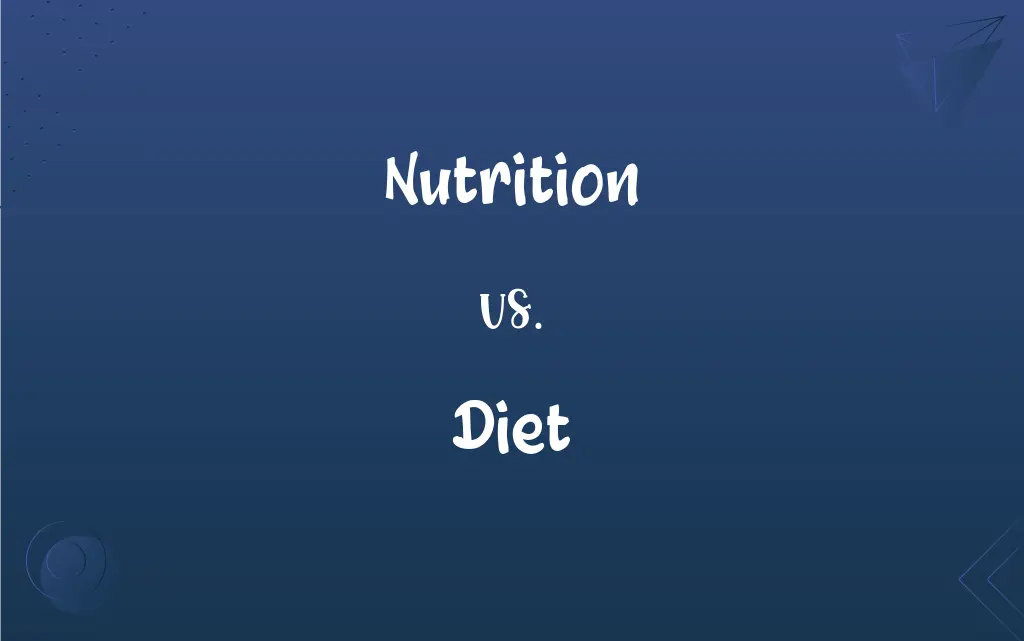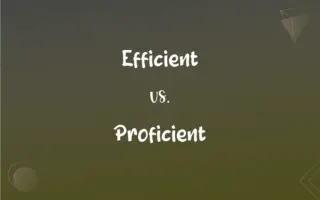Nutrition vs. Diet: What's the Difference?
Edited by Aimie Carlson || By Janet White || Published on October 24, 2023
Nutrition refers to the science or study of how food affects health and growth, while diet refers to the food and drink one regularly consumes. Nutrition focuses on the quality and impact of nutrients, whereas diet is about the actual intake of food.

Key Differences
Nutrition is a science that delves into how organisms obtain and utilize nutrients from food for growth, repair, and maintenance of life. This term often refers to a broader understanding of what each nutrient does in the body and how different food sources can benefit or harm an individual's health. Diet, on the other hand, refers to the kinds of food that a person, animal, or community habitually eats. While nutrition provides the rules and guidelines for healthy eating, diet is the actual application of those principles in everyday life.
In American English, "nutrition" is generally used as a noun, and so is "diet." While "nutrition" doesn't have a commonly used verb form, "diet" can also serve as a verb meaning to restrict oneself to small amounts or special kinds of food to lose weight. This shows a grammatical flexibility for "diet" that isn't commonly found with "nutrition."
Both nutrition and diet are essential to maintaining a healthy lifestyle but serve different functions. Nutrition focuses on the biological needs of the body, detailing the roles that carbohydrates, fats, proteins, vitamins, and minerals play in bodily functions. Diet is more about choices, habits, and cultural factors that affect what one eats on a regular basis.
While nutrition and diet are closely related, they are often used in different contexts. For instance, nutritionists typically deal with understanding the properties of food and how these can be beneficial or detrimental to health. On the other hand, diet often comes into play in discussions about weight loss, lifestyle changes, or cultural eating habits. Diet may be manipulated to improve nutrition, but a diet in itself doesn't guarantee good nutrition.
Comparison Chart
Scope
Study of nutrients and their impact on health
Actual food and drink consumed
ADVERTISEMENT
Grammatical Role
Mainly used as a noun
Used as a noun and a verb
Objective
To understand the biological needs of the body
To outline what one actually eats
Context
Scientific, health-focused
Lifestyle, cultural, often weight-focused
Verb Form
Rarely used as a verb
Commonly used as a verb (to diet)
Nutrition and Diet Definitions
Nutrition
The science of how food affects bodily functions.
Good nutrition is essential for children's development.
ADVERTISEMENT
Diet
The food and drink one regularly consumes.
Her diet consists mainly of vegetables and lean protein.
Nutrition
The process by which organisms get the energy they need.
Nutrition is crucial for metabolic processes.
Diet
A regimen of eating for weight loss.
He's on a low-carb diet to lose weight.
Nutrition
The study of nutrient requirements for growth.
Infant nutrition focuses on vitamins and minerals.
Diet
The usual food and drink of a person or animal.
Nutrition
The intake and utilization of nutrients.
Nutrition plays a significant role in athletic performance.
Diet
A regulated selection of foods, as for medical reasons or cosmetic weight loss.
Nutrition
The process of nourishing or being nourished, especially the process by which a living organism assimilates food and uses it for growth and for replacement of tissues.
Diet
Something used, enjoyed, or provided regularly
Subsisted on a diet of detective novels during his vacation.
Nutrition
The science or study that deals with food and nourishment, especially in humans.
Diet
A national or local legislative assembly in certain countries, such as Japan.
Nutrition
A source of nourishment; food.
Diet
A formal general assembly of the princes or estates of the Holy Roman Empire.
Nutrition
(biology) The organic process by which an organism assimilates food and uses it for growth and maintenance.
Diet
Of or relating to a food regimen designed to promote weight loss in a person or an animal
The diet industry.
Nutrition
That which nourishes; nutriment.
I accidentally ate a worm which was in my apple - my uncle said the extra nutrition would do me good.
Diet
Having fewer calories.
Nutrition
In the broadest sense, a process or series of processes by which a living organism as a whole (or its component parts or organs) is maintained in its normal condition of life and growth.
Diet
Sweetened with a noncaloric sugar substitute.
Nutrition
In a more limited sense, the process by which the living tissues take up, from the blood, matters necessary either for their repair or for the performance of their healthy functions.
Diet
Designed to reduce or suppress the appetite
Diet pills.
Diet drugs.
Nutrition
That which nourishes; nutriment.
Fixed like a plant, on his peculiar spot,To draw nutrition, propagate, and rot.
Diet
To eat and drink according to a regulated system, especially so as to lose weight or control a medical condition.
Nutrition
(physiology) the organic process of nourishing or being nourished; the processes by which an organism assimilates food and uses it for growth and maintenance
Diet
To regulate or prescribe food and drink for.
Nutrition
A source of materials to nourish the body
Diet
The food and beverage a person or animal consumes.
The diet of the giant panda consists mainly of bamboo.
Nutrition
The scientific study of food and drink (especially in humans)
Diet
(countable) A controlled regimen of food and drink, as to gain or lose weight or otherwise influence health.
Nutrition
Quality of sustenance in food.
The nutrition label showed high levels of sugar.
Diet
(by extension) Any habitual intake or consumption.
He's been reading a steady diet of nonfiction for the last several years.
Diet
(usually capitalized as a proper noun) A council or assembly of leaders; a formal deliberative assembly.
They were given representation of some important diet committees.
The National Diet of Japan
Diet
(Scotland) A session of exams
Diet
The proceedings under a criminal libel.
Diet
(Scotland) A clerical or ecclesiastical function in Scotland.
A diet of worship
Diet
(of a food or beverage) Containing less fat, salt, sugar, or calories than normal, or claimed to have such.
Diet soda
Diet
Having certain traits subtracted.
You folks reduce it to the bible only as being authoritative, impoverishing the faith. "Christianity Lite", diet Christianity for those who can't handle the Whole Meal.
Diet
(transitive) To regulate the food of (someone); to put on a diet.
Diet
(intransitive) To modify one's food and beverage intake so as to decrease or increase body weight or influence health.
I've been dieting for six months, and have lost some weight.
Diet
(obsolete) To eat; to take one's meals.
Diet
To cause to take food; to feed.
Diet
Course of living or nourishment; what is eaten and drunk habitually; food; victuals; fare.
Diet
A course of food selected with reference to a particular state of health; prescribed allowance of food; regimen prescribed.
To fast like one that takes diet.
Diet
A legislative or administrative assembly in Germany, Poland, and some other countries of Europe; a deliberative convention; a council; as, the Diet of Worms, held in 1521.
Diet
To cause to take food; to feed.
Diet
To cause to eat and drink sparingly, or by prescribed rules; to regulate medicinally the food of.
She diets him with fasting every day.
Diet
To eat; to take one's meals.
Let him . . . diet in such places, where there is good company of the nation, where he traveleth.
Diet
To eat according to prescribed rules; to ear sparingly; as, the doctor says he must diet.
Diet
A prescribed selection of foods
Diet
A legislative assembly in certain countries (e.g., Japan)
Diet
The usual food and drink consumed by an organism (person or animal)
Diet
The act of restricting your food intake (or your intake of particular foods)
Diet
Follow a regimen or a diet, as for health reasons;
He has high blood pressure and must stick to a low-salt diet
Diet
Eat sparingly, for health reasons or to lose weight
Diet
Cultural or traditional foods eaten by a community.
The Mediterranean diet is known for being healthy.
Diet
Feeding habits of animals in nature.
The diet of the lion includes various prey animals.
Diet
Temporary changes in eating for medical reasons.
The doctor prescribed a low-sodium diet.
FAQs
Is Nutrition a type of science?
Yes, nutrition is a scientific study focused on food's impact on health.
What is Diet?
Diet refers to the food and drinks one regularly consumes.
How do Nutrition and Diet differ?
Nutrition focuses on nutrient quality and impact, while diet is about actual food intake.
Can Diet be used as a verb?
Yes, to "diet" means to follow a specific eating regimen, often for weight loss.
Is Diet just about weight loss?
No, diet can also refer to regular eating habits, cultural foods, or medical requirements.
What are the grammatical roles of Nutrition and Diet?
Nutrition is mainly a noun, while diet can be both a noun and a verb.
Do Nutrition and Diet affect mental health?
Yes, both nutrition and diet can impact mental health.
Is Nutrition only for humans?
No, nutrition applies to all organisms that require nutrients from food.
Can a Diet be healthy or unhealthy?
Yes, a diet can be either healthy or unhealthy depending on its nutritional quality.
What is Nutrition?
Nutrition is the science of how nutrients in food affect health and growth.
What factors can influence Diet?
Lifestyle, medical conditions, and personal preferences can influence diet.
What’s the role of Nutrition in sports?
Nutrition helps athletes maintain energy levels and improve performance.
Can one's Diet affect their Nutrition?
Yes, the diet you follow significantly impacts your nutrition.
What are some fields related to Nutrition?
Nutritional science, dietetics, and food science are related to nutrition.
Is Diet culturally influenced?
Yes, diet can be influenced by cultural, social, or traditional factors.
About Author
Written by
Janet WhiteJanet White has been an esteemed writer and blogger for Difference Wiki. Holding a Master's degree in Science and Medical Journalism from the prestigious Boston University, she has consistently demonstrated her expertise and passion for her field. When she's not immersed in her work, Janet relishes her time exercising, delving into a good book, and cherishing moments with friends and family.
Edited by
Aimie CarlsonAimie Carlson, holding a master's degree in English literature, is a fervent English language enthusiast. She lends her writing talents to Difference Wiki, a prominent website that specializes in comparisons, offering readers insightful analyses that both captivate and inform.






































































